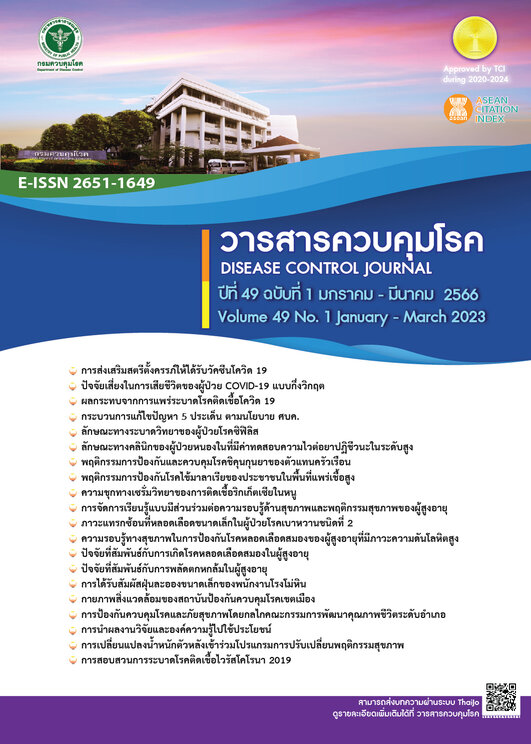The effectiveness of participatory learning management program on health literacy and health behavior among elderly with non-communicable diseases
DOI:
https://doi.org/10.14456/dcj.20223.10Keywords:
the participatory learning management program, elderly, non-communicable diseases, health literacy, health behaviorAbstract
This study aimed at assessing the effectiveness of participatory learning management program for elderly people with non-communicable diseases on health literacy and health behavior. The comparisons of health literacy and health behavior at baseline, 3-week after launching program, and follow-up period. The samples consisted of 14 adults elderly aged 60-69 years with high blood pressure and diabetes participated the participatory learning management program for 15 hours. The health literacy and behavior promotion questionnaire validated by 5 experts with item-objective congruence were 0.67-1.00 in both parts; and the Cronbach’s Alpha reliability coefficients were 0.95 and 0.73, respectively. The data were analyzed by mean, standard deviation, and repeated MANOVA. The results showed that the average scores for health literacy and health behaviors before the program, after the program, and during the follow-up, were different at 1% significance level and tended to increase steadily. The participatory learning management program should be used as a guideline for preparing programs to promote the better health or applying to other chronic diseases in order to encourage people with non-communicable diseases to have good health.
Downloads
References
Foundation of Thai Gerontology Research and Development Institute (TGRI). Situation of The Thai Elderly 2019. Nakhon Pathom: Foundation of Thai Gerontology Research and Development Institute (TGRI); 2020. (in Thai)
Aekplakorn W, editors. Report of the Thai People's Health Survey by Physical Examination No. 6, 2019-2020. Bangkok: National Health Examination Survey Office; 2021. (in Thai)
Zhang J, Gilmour S, Liu Y. Ota E. Effect of health literacy on quality of life among patients with chronic heart failure in China. Qual Life Res [Internet]. 2020 [cited 2022 April 10];29(2):453-61. Available from: https://doi.org/10.1007/s11136-019-02332-4
Saeed H. Saleem Z. Naeem R. Shahzadi I. Islam M. Impact of health literacy on diabetes outcomes: a cross-sectional study from Lahore, Pakistan. Public Health [Internet]. 2018 [cited 2022 April 10];156:8-14. Available from: https://doi.org/10.1016/j.puhe.2017.12.005.
Nilnate W. Health literacy in Thai elders in senior citizens club of Bangkok [dissertation]. Bangkok: Chulalongkorn University; 2014. 216 p. (in Thai)
Pannark P, Moolsart S, Kaewprom C. Effectiveness of a Program for Health Literacy Development of the Patients with Uncontrolled Type 2 Diabetes at Bangwua District,
Chachoengsao Province. Nursing Journal of the Ministry of Public Health. 2017;27(3):91-106. (in Thai)
Chiankhong A. Effectiveness of Development of Health Literacy Through controlled transformative learning due to glycemic control behavior among diabetic patients. [Dissertation]. Bangkok: Srinakharinwirot University; 2018. 271 p. (in Thai)
Charoenphan J. Community in public health management. 8th ed. Maha Sarakham: Faculty of Public Health, Mahasarakham; 2010. (in Thai)
Knowles MS, Holton EF, Swanson RA. The Adult Learner, The Definitive Classic in Adult Education and Human Resource Development. 7thed. Burlington: Elsevier; 2011.
Department of Administrative Affairs, The Bureau of Registration Administration (TH). Population statistics by district of Pathum Thani Province, Thanyaburi, December 2019 [Internet]. 2019 [cited 2021 Dec 18]. Available from: https://stat.bora.dopa.go.th/StatMIS/#/ReportStat/2 (in Thai)
Thiravisit A. Technique and conceptual Tools for Community Study. Workshop forum Rural areas of Thailand; 2018 June 28-31; Bangkok: Thailand sustainable development forum; 2018. (in Thai)
Sørensen K, Van den Broucke S, Fullam J, Doyle G, Pelikan J, Slonska Z, et al. Health literacy and public health: A systematic review and integration of definitions and models. BMC Public Health [Internet]. 2012 [cited 2021 Dec 18];12:1-13. Available from: https://doi.org/10.1186/1471-2458-12-80
Pengchan W. Health Literacy. [Internet]. 2017 [cited 2021 Nov 18]. Available from: http://www.hed.go.th/news/file/321 (in Thai)
Allen IE, Seaman J. Class Differences: Online Education in the United States [Internet]. 2010 [cited 2021 Nov 18]. Available from: https://files.eric.ed.gov/fulltext/ED529952.pdf
Kolb DA. The Kolb learning style inventory. Boston, MA: Hay Resources Direct; 2007.
Khammani T. The science of teaching, knowledge for organizing effective learning processes. 19th ed. Bangkok: Chulalongkorn University Press; 2015. (in Thai)
Wiratchai N. Sample size determination in research hypothesis testing entitled “Accurate and modern method for determining sample size”. Research Zone Project; 2012 January 26; Bangkok: National Research Council of Thailand; 2012. (in Thai)
Sørensen K, Van den Broucke S, Pelikan JM, Fullam J, Doyle G, Slonska Z, et al. Measuring health literacy in populations: illuminating the design and development process of the European Health Literacy Survey Questionnaire (HLS-EU-Q). BMC Public Health [Internet]. 2013 [cited 2021 Nov 18];13:1-10. Available from: https://doi.org/10.1186/1471-2458-13-948
Roma W, Thanasukarn C, Thiphayamongkolkul M, Emyong N, Neelapaijit N, Kloiiam S, et al. Health literacy survey of Thai people aged 15 years and over, 2017 (Phase 1) [Internet]. 2013 [cited 2021 Nov 22]. Available from: http://164.115.27.97/digital/files/original/a6e73814efb58a07991c5be54b1498d1.pdf (in Thai)
Ruangpraphan C. Basic statistics with sample analysis with Minitab SPSS and SAS. 5th ed. Khon Kaen: Khon Kaen University; 2000. (in Thai)
Thanasukarn C, Neelapaijit N, Development of a health literacy measurement tool for people with diabetes and hypertension [Internet]. 2015 [cited 2021 Nov 22]. Available from: http://www.nkp-hospital.go.th/th/H.ed/mFile/20180122115054.pdf (in Thai)
Pensirinapha N, Thamkul T, Ngowsiri K. Effects of a participatory health promotion program for the elderly with chronic non-communicable diseases in the area of Nonthaburi Municipality. Nonthaburi: Sukhothai Thammathirat Open University; 2018. (in Thai)
Porsing S, Hansakul A. Effectiveness of Learning Programs Knowledge and self-care behaviors in Participatory Learning to Elderly’s Nongbuakhok Sub-district, Chatturat District, Chaiyaphum Province. Journal of the office of DPC7 Khon Kaen. 2011;19(1):39-53. (in Thai)
Downloads
Published
How to Cite
Issue
Section
License
Copyright (c) 2023 Disease Control Journal

This work is licensed under a Creative Commons Attribution-NonCommercial-NoDerivatives 4.0 International License.
Articles published in the Disease Control Journal are considered as academic work, research or analysis of the personal opinion of the authors, not the opinion of the Thailand Department of Disease Control or editorial team. The authors must be responsible for their articles.






